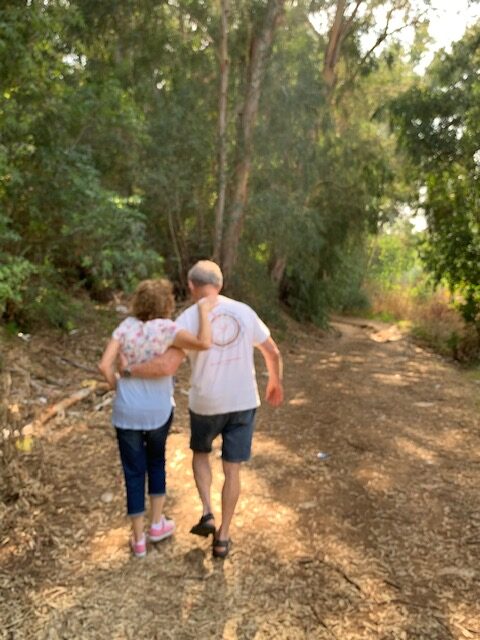Earlier today, I had the honor to present the last lecture in the series of presentations for the second generation which I have been doing since August 2020, together with my friend and colleague Dr. Jenni Frumer. The topic of our previous (second-to-last) meeting, which took place on Sun. Feb. 14, focused on intimacy and on specific characteristics of the second generation that might have encumbered some of us in our pursuit of intimacy in our most meaningful relationships.
As I mentioned more than once throughout our meetings over the past few months, the legacy of the Holocaust and the intergenerational transmission to the children of survivors has resulted in a profile of strengths alongside unique vulnerabilities. As a group, the second generation has manifested good adaptation, as measured by external educational and socio-economic accomplishments, as well as unique strengths and resiliencies which are related to growing up in survivor families. Alongside these strengths, adult children of survivors also show a host of less-visible vulnerabilities which are manifested primarily in the private realm of one’s subjective experience and intimate relationships.
In the Feb. 14 meeting, I focused on intimacy and our relationships. As “Baby Boomers” (and many of the second generation among them) are re-defining ‘old age’, we are living longer and better, enjoying the benefits of a potentially long and vibrant chapter in life, which is no longer defined by work or by raising a family. We bring to this phase in life some important gains, such as a greater maturity and ‘emotional complexity’, the capacity to hold multiple truths at the same time, to see things from multiple perspectives, and a thinking style that is not as “black or white” as it might have been in our younger years. The loss of our survivor parents as they pass away is a significant life transition. For many second generation individuals, especially daughters of survivors, the pull of obligations to one’s own family and the obligations to the survivor parents’ care have been a life-long exhausting dilemma and drain. The passing of the survivor parents inevitably leaves a huge hole that had been previously filled by the intense loyalty to their care and to protecting them. Alongside the sorrow and grief about their loss, this transition also opens up a certain new space and frees some emotional energy. In this new space, we might want to re-evaluate and turn towards relationships with spouses or partners, with adult children and others. Research has shown that the quality (not quantity!) of relationships we enjoy, where we feel truly accepted, seen for who we are, and appreciated, is critical not only for our mental health and well-being, but is also highly correlated with measures of physical health. A nationally representative study found that people who feel lonely, even those living within a marital relationship, have poorer health and a higher risk for earlier death. Cultivating and tending to our relationships is particularly important at this time in the life of the second generation and, for those who share a life with spouses/partners, these relationships are especially important to attend to.
In the Feb. 14 meeting, I spoke about some aspects of the developmental history of the children of survivors that are relevant to our relationships later on in our lives as adults. From a developmental perspective, our past is in every step we take. Sometimes, old ways of relating, based on emotionally laden interactions from our family of origin that have been carried forward into subsequent relationships, might prevent us from getting the most out of what is possible in the present. As we discussed in previous meetings, parental symptoms of PTSD and trauma-related relational themes can impair the quality of parental affective and emotional presence. The lack of parental emotional availability might lead to experiences of “failed intersubjectivity” (Wiseman, 2008) in the relationships in the family: children of survivors might not have been able to understand the reactions and behavior of their survivor parents, and might have felt that they are not being understood by them. This chronic state of not understanding each other can lead to a sense of chronic loneliness. Such relational experiences might become internal “working models” for future relationships, and might color how we behave and how we subjectively experience our relationships.
I would like to suggest that there is a potential relevance here to some findings from my recent empirical study about the reactions of offspring of survivors to the coronavirus pandemic. The study was conducted between July-October 2020. together with my colleague Prof. Shrira from Bar-Ilan University. One of the important findings we observed was that the children of survivors reported the same amount of social support (similar number of relationships, type of contact and frequency of contact) during the pandemic as their peers who were not children of Holocaust survivors. And yet, the children of survivors reported feeling more loneliness than their peers. These observations reflect the influence of subjective perceptions on the way we feel, and the importance of re-evaluating the accuracy of our perceptions and expectations. Reflecting upon why it is that we, offspring of survivors, might feel more lonely than our peers, even when we acknowledge a similar level of social support, can be an opportunity to improve the subjective and intersubjective experiences of children of survivors during the COVID-19 pandemic and beyond.
In the Feb. 14 meeting, we reviewed some practical suggestions for strengthening relational competence and improving relationships, which I will briefly outline below. Using these tools for conscious self-reflection can allow us to review, identify and ‘tweak’ old and ingrained patterns, and thereby improve our relational competence.
- Improve your use of constructive communication:

We have many ways to respond in relationships. Some of us use more active styles and some of us tend to use passive styles of communication. It is important to become aware of our own style, to be able to choose the impact we desire to have, and to avoid unintended negative results. The following list identifies 4 styles of communication:
-
- Passive constructive: biting your tongue is sometimes a good idea!
- Passive destructive (passive aggressive): means saying or doing something hurtful and taking no accountability for it.
- Active destructive: is something we all can easily recognize.
- Active constructive: saying what we need to say while consciously focusing on the real aim: do we want the other to be able to take in and make use of what we say, or do we just want to ‘vent’ our frustration? Do we want to say something that will help the relationship in the future or do we prefer to avoid some necessary unpleasantness? Giving constructive criticism so it can actually be accepted; being assertive without being aggressive, giving specific, authentic apologies when needed, are all part of this style of responding to challenging moment in relationships while keeping our real goal in mind.
A very important skill that is less often remembered, but very important in order to “irrigate” relationships with the good stuff that makes us feel truly seen and appreciated, is the capacity to give specific, authentic praise when deserved.
And first and foremost, be aware of verbal and non-verbal communication: body language, the pace with which we move, the tone of voice we use, all speak loudly to our brain and are perceived as cues for unsafety in the relationship, even if we think we are saying the ‘right’ things.
- When you feel that something just triggered you, use your “ABC”:
Learn to differentiate between:
-
- Activating event: what just happened that cause you to feel a negative emotion?
- Beliefs about it: how do you find yourself interpreting/explaining what happened? (for example, “my needs always come last!” “He/she never understands me!”)
- Consequences of these thoughts, in terms of your subjective feelings and outward behaviors
- Identify your “Icebergs in the deep”: “Icebergs” are deeply held beliefs (positive and negative) and core values. Some of our relational stances and core values from the relationships with survivor parents are not useful or adaptive when ‘imported’ too rigidly to our relationships with others, such as spouses, adult children or friends.
-
- What might be your beliefs about self/other? About your place in your relationships?

- Once an iceberg is identified, it should be re-evaluated against the following questions:
- Is it still meaningful to me?
- Is it accurate/appropriate for this situation?
- Is it overly rigid? Am I allowing some corrective feedback to consider other explanations?
- Is it useful, does it enhance my functioning and that of others around me (Reivich, Seligman & McBride, 2011)
- Identify your self-soothing, re-vitalizing resources: we need to replenish and know what works for us when we need to re-fill our ‘batteries”.

-
- Meditation, yoga, massages
- A walk in nature
- Self hypnosis, self compassion exercises, positive imagery
- Controlled breathing; progressive muscle relaxation
- Exercise, fitness, dance
- Sex
- Laughter
- Sleep
- In a post-COVID-19 world, the list will include again additional activities!
I wish you all a happy Purim and all the best,
Irit Felsen

Thank you so much for all you do! Our meetings have been so beneficial for me. Looking forward to attending group meetings in the future! Purim Sameach! Stay well and safe!! Leah Rocklin
Wonderful, constructive discussion. I feel like you are speaking to me directly.
Thank you again & again for your time, efforts and devotion to disseminating all of your knowledge, experience and expertise in the ultimate goal of helping people achieve their best selves so that it may have a ripple effect outward to their families, communities and society at large.